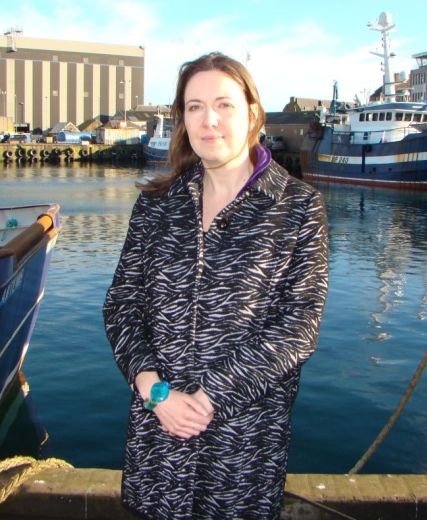A new book Oil Strike North Sea will be published on the 7th September. It is an overview and history of the search for oil and gas in the North Sea, something author Mike Shepherd has been actively involved with since 1980 and several of his own experiences are described in the book. Mike shares with Voice readers how the book came about, and his belief that Aberdeen Was Short-Changed Over North Sea Oil.
 I had cooperated with Diane Morgan on her recent book, Aberdeen’s Union Terrace Gardens. Diane asked me to contribute one of the chapters in the book detailing the economic background to the abortive city garden project.
I had cooperated with Diane Morgan on her recent book, Aberdeen’s Union Terrace Gardens. Diane asked me to contribute one of the chapters in the book detailing the economic background to the abortive city garden project.
Working so closely with a professional author such as Diane had inspired me to write my own book and the North Sea oil industry was an obvious topic, particularly as not many non-technical books have been written on it.
Diane very graciously provided an introduction to my book and seems to have enjoyed reading it going by her comments.
I want to concentrate here on one small aspect and this is part of the chapter dealing with Aberdeen.
Although I’m Aberdonian born and have lived in the city for most of my life, the details of my research for this section astonished me when I realised its significance – it became clear that the Aberdeen area has been massively short-changed by both national governments over the last 40 years.
Let’s summarise the case: The tax take from North Sea oil and gas is now more than £300 billion. The amount provided by both the UK and Scottish national governments to support onshore North Sea oil infrastructure in the Aberdeen area – almost nothing. So who paid for the onshore infrastructure then? We did.
The funding was largely provided out of our local rates and council taxes. I’ll quote from the book, Running the Granite City Local Government in Aberdeen 1975-1996 (Davidson, K and Fairley, J 2000, Scottish Cultural Press), because I am not sure anyone would believe the figures if I merely cited them:
“The withdrawal of government support for industry meant that the public sector effort was primarily that of local authorities. Local authority estimates suggested that between 1975 and the early 1990s council expenditure on oil-related developments was well over £100 million per year throughout the Grampian Region.”
Check that, over £100 million per year. It’s ironic that several other regions in the UK have directly benefitted from North Sea oil revenues but not Aberdeen. The Shetland Isles, having gained revenue from the Sullom Voe oil terminal, have accrued an oil fund of over £400 million in two separate trusts; the Orkneys likewise have an oil fund of about £200 million.
Elsewhere, as a consequence of the agreement on licence boundaries in 1966, Northern Ireland gets 2.5 per cent of oil and gas royalties and until 1991, the Isle of Man received 0.1 per cent. Yet, an initiative by Grampian Regional Council to apply rates to offshore oil platforms was stopped by the UK government.
How did this situation happen?
 Here is the explanation given in my book. When the North Sea started up in the 1970s, the Labour Party in government were keen to try and get as much of the industry as possible relocated to the Glasgow area.
Here is the explanation given in my book. When the North Sea started up in the 1970s, the Labour Party in government were keen to try and get as much of the industry as possible relocated to the Glasgow area.
There was an under-employed workforce in Glasgow that could easily adapt to the engineering skills required for North Sea oil, whereas the Northeast of Scotland was deemed likely to be overwhelmed both environmentally and socially by the oil industry.
They didn’t want the oil industry here. Despite for instance, the establishment of the new British National Oil Company headquarters in Glasgow, the oil companies in any case decided to move to Aberdeen.
Maggie Thatcher’s Conservative Party took over government in 1979.
It wasn’t their policy to give regional funding to support private enterprise even if the case was well-deserved; the Aberdeen area was considered remote and politically irrelevant for their purposes. A large proportion of the oil revenues was used to support a reduction in the top rate of income tax which in turn fuelled house price rises in England.
When the Scottish government turned up in the 90s, nothing much changed.
The political central of gravity in Scotland is the Central Belt and Aberdeen is almost as remote to Holyrood as it is to Westminster. Witness the case of the funding for the Aberdeen bypass by the Scottish government. In an extraordinary decision, both Aberdeen City and Aberdeenshire Council are each expected to fund 9.5 per cent of the costs, something neither council can afford given their debts.
Where does this leave Aberdeen? What happens once the oil industry leaves the area? Despite all the guff about city centre regeneration, Aberdeen’s big problem is its transport links with the rest of the country and its industrial base outside of North Sea oil activities. Aberdeen is just as remote now as it was before the oil industry came.
The UK’s motorway network stops at Perth and the roads north of Aberdeen are a joke; they have not received the investment they deserve. Even the railway between Aberdeen and Dundee is single track for a short section south of Montrose and this leads to a major rail bottleneck. There has been a lot of jaw-jaw about improving this section but it has never happened.
North Sea oil will leave a legacy to Aberdeen. While it has lasted, much of Aberdeen’s native industry has gone. One paper mill remains, the Crombie cloth mills have shut and Aberdeen’s two shipbuilding yards are no more. Aberdeen also used to hold one of the UK’s largest fishing fleets. Over the years Aberdeen has become largely a one-horse town and that horse is the energy industry.
A fairly obvious move would have been for the Scottish government to have promoted the area for renewables, but this hasn’t happened to any major extent. I see this as a major shortcoming, as there is an obvious crossover between the engineering skills of the oil and gas industry and renewables.
What is Aberdeen’s future? It should primarily be as a center for renewables but this would require a change in policy from the Scottish government in order to preferentially commit resources here. Some in our local business community see tourism as a growth area for the city even though a unique selling point for the city, it’s distinctive architecture and building stone, is being increasingly blighted by soul-less modern developments.
What is clear and has been clear for almost a decade is that there is a concerted need for a discussion on the future of Aberdeen. This should focus on funding, regional transport links and to promote a future Aberdeen as a centre for Scotland’s renewable energy industry.
The book launch for ‘Oil Strike North Sea’ is at Waterstones book shop in Union Street, 7pm on Wednesday 9th September.
- Comments enabled – see comments box below. Note, all comments will be moderated.









